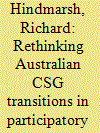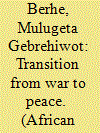|
|
|
Sort Order |
|
|
|
Items / Page
|
|
|
|
|
|
|
| Srl | Item |
| 1 |
ID:
154145


|
|
|
|
|
| Summary/Abstract |
This essay focuses on recent proposals to confer decisional status upon deliberative mini-publics such as citizens' juries, Deliberative Polls, and citizens' assemblies. Against such proposals, I argue that inserting deliberative mini-publics into political decision-making processes would diminish the democratic legitimacy of the political system as a whole. This negative conclusion invites a question: which political uses of mini-publics would yield genuinely democratic improvements? Drawing from a participatory conception of deliberative democracy, I propose several uses of mini-publics that could enhance the democratic legitimacy of political decision-making in current societies.
|
|
|
|
|
|
|
|
|
|
|
|
|
|
|
|
| 2 |
ID:
166964


|
|
|
|
|
| Summary/Abstract |
In public participatory contexts, at a time of policy crisis, this paper explores the enduring contestation, and associated policy responses to such contestation, regarding controversial coal seam gas (CSG) well siting in Australia's CSG development States of Queensland, New South Wales, and Victoria. Participatory deficits are well identified in the Australian literature on the “CSG debate” and subsequently in our analysis of (participatory-associated) policy responses to the CSG debate. Highlighted are concerns around inadequate community engagement involving inequitable power relations between communities and CSG companies, CSG project information deficits and community disrespect, and deficit State CSG regulations. The findings show that policy responses have been more supportive of CSG developers and development than “challenger” issues. Consequently, enduring local social conflict has resulted, and overall, transitions to cleaner energy pathways to meet climate change policy obligations have become “messy”. Overall, CSG development reflects a significantly dysfunctional, “decoupled”, socio-technical energy development system, especially regarding social concerns. Accordingly, participatory remedies are posed on how policymakers can better engage with the concerns of communities and citizens in the broader context of multi-functional and multi-stakeholder energy/landscape conflicts, to better address these conflicts and ensure more effective cleaner energy transitions.
|
|
|
|
|
|
|
|
|
|
|
|
|
|
|
|
| 3 |
ID:
154377


|
|
|
|
|
| Summary/Abstract |
The objective of this paper is to chronicle the 1991 to 1997 Ethiopian disarmament, demobilisation and reintegration (DDR) experience in the context of Ethiopia’s transition from war to peace. The DDR project is usually a post-conflict political project that should be analysed in the overall context of transition from war to peace. The literature on the Ethiopian experience is focused on the technical aspects of the programme and the assessment of its impacts, with little to no attempts made to capture the experience in the context of Ethiopia’s transition from war to peace. Given that there are many existing and several incoming post-conflict countries, capturing the successful Ethiopian DDR experience is important, as some aspects will inform the design of ongoing and upcoming transitions from war to peace. This paper illustrates the wider challenges of the transition from war to peace as a context for the DDR programme, delves into the key strategies and elements of the programme, and summarises its impact assessment. In the conclusion, the key lessons to be learned from the experience are laid out.
|
|
|
|
|
|
|
|
|
|
|
|
|
|
|
|
|
|
|
|
|